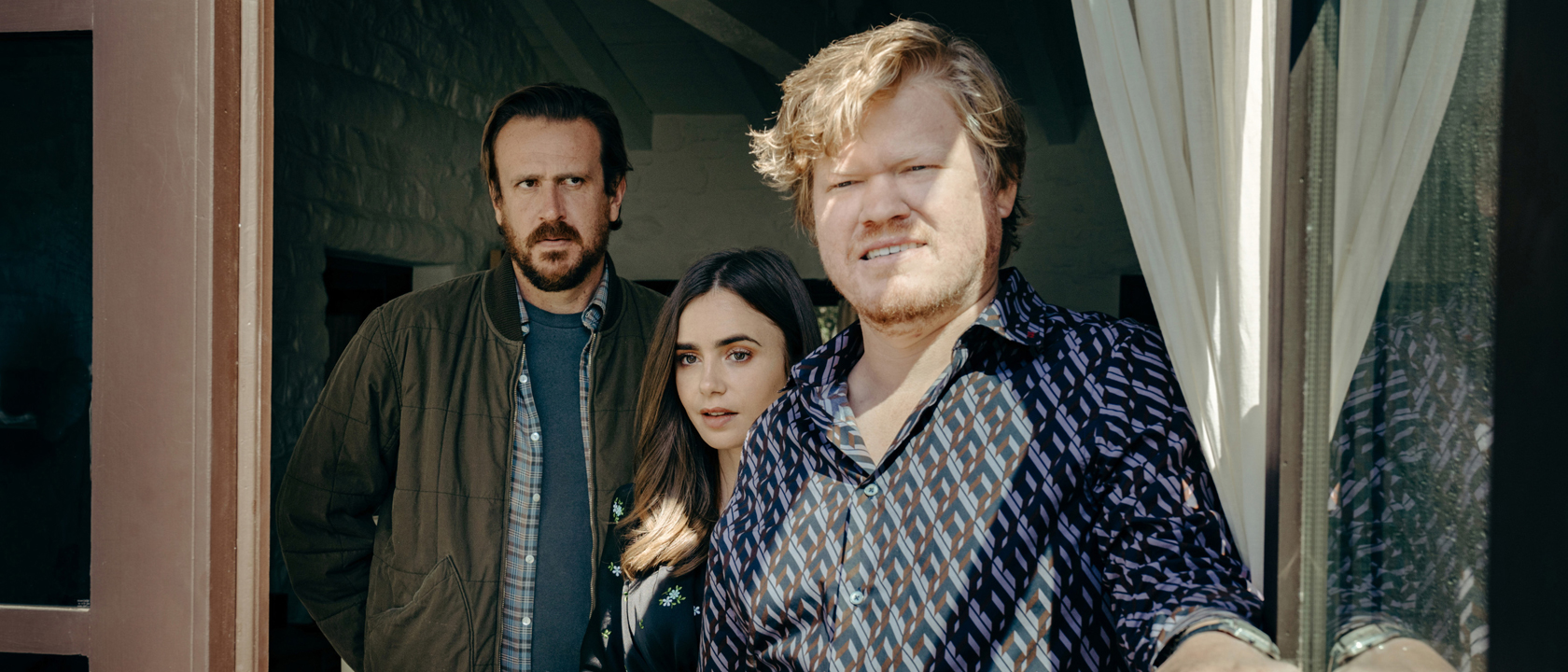As the COVID-19 pandemic continues to impact our society and culture, locked door thrillers and dramas have proven to be an interesting outlet for filmmakers. It’s logical, both psychologically and practically. While following social distancing protocols and being health conscious, people around the world have experienced movie-worthy drama in their own lives while in lockdown, and as a result, the ability for any of us to relate to characters’ circumstances increases. It’s also just a hell of a lot easier to make a film in general when you are only using one location and a limited number of principal characters.
When film critics and historians eventually create an entire field of study around the mid-pandemic era of moviemaking, I can imagine Charlie McDowell’s Windfall being held up as a perfect model case – not only because of the limitations that inspired its creation and execution, but also because of its poignant and sharp examination of the wealth gap in our society (an issue which has only been magnified since the global spread of COVID-19 began).
Windfall was initially conceptualized by Charlie McDowell, Jason Segel, Justin Lader and Andrew Kevin Walker out of the desire to remain creative during the pandemic, and with the filmmakers knowing that they could have access to shoot at a specific house on an orange grove in Ojai, California. What they hatched was the idea for a peaceful home invasion that quickly spirals into a tense hostage situation, with four unnamed, complex characters providing absorbing perspectives as they all try and work toward a peaceful conclusion to the drama.
As we first enter the aforementioned Ojai property, its lavish amenities are being enjoyed by Nobody (Jason Segel). He sits in the sun drinking a glass of orange juice, eats fruit right off the branch in the orchard, and while rifling through drawers finds a fair amount of cash to fill his pockets. Of course, it’s quite apparent that he is not supposed to be there – and panic sets in when the actual owners, CEO (Jesse Plemons) and Wife (Lily Collins), arrive for a spur-of-the-moment getaway weekend.
Nobody at first tries to slink out the door without being noticed, but everything goes sideways when Wife spots him. At first, the home invader’s plan is to keep CEO and Wife confined in an on-property steam room and escape with a head start – confident that he has left no trace of himself at the house and that they won’t be able to remember him – but that idea goes out the window when he discovers that there is a security camera right above where he parked his car.
Pivoting, Nobody understands that he can’t destroy the security footage, and decides that his only out is to take enough money from CEO that he can disappear and live his life on the run. Of course, that quantity of cash can’t be summoned instantly, and they learn that the money won’t be delivered until the following night. With Nobody keeping hold of a gun that he finds in a drawer, the trio spends a tense 36 hours together, with patience wearing thin and tensions slowly rising.
Windfall's compelling characters keep you hooked as the clock ticks down.
A reflection of the characters’ namelessness, few details are provided about Nobody, Wife, and CEO as people beyond their present circumstance, with Windfall keeping a tight lid on exposition. They don’t present as bland abstracts, however, as the movie has a way of providing just enough information about them so that you can see the situation through their specific points of view.
Nobody is obviously a criminal, but he also has a compelling eat-the-rich hunger with which it’s exceptionally easy to empathize. CEO is a victim of a theft, but he is also an egotistical, classist jerk with no recognition of his privilege and advantages. Between these respective id and superego-driven personalities is Wife, who didn’t grow up with money, but knew the life-changing choice she was making when she agreed to marry the one of the wealthiest men in the world.
Their individual perceptions of the world instantly drive divisions between them, and sly deceptions stirred into the mix see loyalties shift and become questionable. It’s a slow burn with an explosive finish.
There's a slowdown in the middle of Windfall, but it finds a (no pun intended) second wind.
Pulling off a slow burn with a story as intimate and confined as Windfall’s is tricky business, but the film is mostly successful. There is a drag in the second act when the characters are ironically killing time until the money arrives, but the movie is reenergized with the introduction of the fourth character in this tale: a talented and enterprising Gardner (Omar Leyva) who tries to grasp at opportunity when he finds himself in the position of having face time with CEO. This new player winds up having a fascinating impact on the socio/economic themes of the plot – though I unfortunately can’t dig too far into details without brushing against key spoilers.
This also happens to be one of those magical thrillers packing an ending that makes one reconsider everything that precedes it, and instantly inspires rewatch curiosity.
Jesse Plemons, Jason Segel, and Lily Collins all deliver terrific, dynamic performances.
Like any talk-heavy, theatre-like drama, performances are vital, and all three stars here are doing tremendous work. Jesse Plemons, who just keeps proving himself one of the most impressive talents of his generation, is the standout, putting on a slick and sinister turn that is comical while never making CEO likable (a thin line to walk). Jason Segel, meanwhile, succeeds in the sinister, using his natural charisma to counterbalance his skuzzy appearance and behavior. Between the two men, Lily Collins’ work is more subtle, but also surgical and intriguing.
While film as a medium allows creatives to change the rules of time and reality, I will forever be fascinated by a movie that can retain my attention for 90 minutes with a handful of characters and one enclosed space – and Windfall gives my constant itch a through scratching. It’s a stylish, well-crafted Hitchcockian thriller, a smart modern commentary, and a great actor showcase.

Eric Eisenberg is the Assistant Managing Editor at CinemaBlend. After graduating Boston University and earning a bachelor’s degree in journalism, he took a part-time job as a staff writer for CinemaBlend, and after six months was offered the opportunity to move to Los Angeles and take on a newly created West Coast Editor position. Over a decade later, he's continuing to advance his interests and expertise. In addition to conducting filmmaker interviews and contributing to the news and feature content of the site, Eric also oversees the Movie Reviews section, writes the the weekend box office report (published Sundays), and is the site's resident Stephen King expert. He has two King-related columns.











